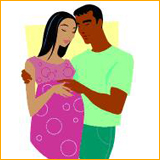| Mental Health Tips | |
| Common Mental Problems | |
| Substance Misuse | |
| Treatment of Mental Disorders | |
| Mental Health Education Pamphlets | |
 Antenatal and postnatal mental health problems
Antenatal and postnatal mental health problems
(Special thanks to Dr Bonnie Siu of Institute of Mental Health, Castle Peak Hospital, for authoring this article)
The majority of people will view pregnancy and child birth as a happy and delightful event. In fact, there are major changes in the psychological and physiological states of a woman during her pregnancy and postnatal period. The hormonal changes, the role change as well as the anticipatory new challenges in life such as child care and family problems that the woman has to face can bring about depressed, irritable and anxious mood. However, quite a large number of women will focus on the future child care issues and have ignored their mood changes. This will not only affect their general well-being, but also adversely hindered their ability in child care and the future growth and development of their child.
1. Antenatal Mood Changes
2. Post Natal Blues
3. Post Natal Depression
4. Post Natal Psychosis
5. Relapse of Previous Psychiatric illness
6. Postnatal Anxiety Disorders
1. Antenatal Mood Changes
About 10% of pregnant women will have depressed mood and sometimes, the depressed mood will extend to the postnatal period and resulted in depression:
Causes: Psychosocial problems
Symptoms: Usually occurs in the first and third trimesters of pregnancy.
First trimester: Ambivalent attitude towards pregnancy, especially those that have unplanned pregnancy and those who are single; somatic discomfort during pregnancy causing adjustment problems.
Third trimester: Worries concerning the health of the fetus and the future baby; worries concerning the delivery process; somatic discomfort in advanced pregnancy causing insomnia and distress.
The provision of practical help such as on child care and psychological and social support can help the woman in alleviating her depressed mood. However, if the mood problems persist, the woman can seek help at the Maternal and Child Health Centre or from the health care professionals such as doctors.
2. Post Natal Blues
About 30 to 80% of postnatal women have mood disturbances lasting for 1 to 10 days about a few days after delivery.
Causes: Hormonal changes after delivery are the proposed causes. On the other hand, the stress arises from first motherhood can also be the cause. Those having premenstrual anxiety symptoms may have a higher chance of getting postnatal blues.
Symptoms: Mood fluctuations, apprehension, depressed mood, increased irritability, labile mood; cried easily; insomnia; difficulty in concentration; felt having distant relationship with the baby; felt having muddled thinking.
No special treatment is required. Reassurance, psychological, and practical support are enough. The symptoms usually resolve in a few days’ time. However, if the symptoms persist for more than 10 days and if the symptoms become severe, advices from doctors may need to be sought for.
3. Post Natal Depression
Different research studies reveal that 10-15% of recently delivered women suffer from depression. It usually occurs 4 to 6 weeks after delivery and the symptoms are quite similar to that of the postnatal blues. But the symptoms are more severe and last longer. If left untreated, the symptoms can last from 6 months to more than a year.
Causes: Role changes; child care stress; hormonal changes; financial hardship; relationship problems with mother-in-law; housing problems; career changes.
Symptoms:
- Persistent depressed mood, labile mood, cried easily
- Lack of interest
- Anxious and irritable, temper outbursts
- Lack of confidence, self-blame, guilty feeling
- Lack of volition, lack of energy, insomnia, easily get tired
- Changes in appetite, decreased appetite, binge eating, increased or decreased weight
- Slow in response, difficulty in concentrating, indecisiveness
- Excessive worries concerning the safety and health of the child, lack of interest in child care, afraid of baby crying, refuses to be close to the baby, difficulty in facing the challenges in life
- Negative cognitions, hopelessness, anger and hatred towards the baby, the belief that the baby will bring along bad fate
- In the severe case, there will be delusion, hallucination, suicidal thought and thought of baby harm
The early identification and treatment of postnatal depression can bring about recovery and cure. Help can be sought from the Maternal and Child Health Centres where appropriate referrals to health care professionals can be made. Apart from psychological treatment and marital therapy, medication treatment is required for some cases. There would be 20 to 40% risk of relapses in the subsequent pregnancies and deliveries.
Risk factor for postnatal depression
Every recently delivered woman has the possibility to develop postnatal depression, the followings are the risk factors for postnatal depression:
- Family history or past personal history of depression
- Lack of family planning, such as unplanned pregnancy and being unmarried
- Major life events such as loss of job or death of a family member during pregnancy
- Changes in life such as marital relationship problems, relationship problems with mother-in-law, financial hardship
- Complications of pregnancy and delivery such as threatened abortion, complicated delivery, excessive blood loss at delivery, neonatal death
- Lack of social and emotional support in the postnatal period, lack of rest or insomnia
- The need to take care of a baby with health problems, a premature baby, or a baby who cries frequently
Adverse effects of postnatal depression:
- Lack of confidence
- Risk of suicide, child abuse, infanticide
- Mother-infant relationship problems, decreased child care ability and hindrance to the development of the child (Siu et al., 2010)
- Marital discord
- Afraid of future pregnancy
Prevention of postnatal depression
- Plan pregnancy in advance
- Beware of the role change to motherhood and its responsibility
- Attend antenatal class and health educational talks on pregnancy to increase the knowledge of pregnancy and delivery
- Husband needs to enrich himself with the knowledge of pregnancy and delivery and needs to provide support to his wife
- Avoid major changes during pregnancy
- Ensure enough rest and sleep
- Arrange time appropriately
- Good communications with family members
4. Post Natal Psychosis
A rare but severe postnatal mental health problem that affects 1 in 500 women after delivery. It usually occurs in the first 2 weeks after delivery. The symptoms become severe quickly after onset and immediate treatments are needed:
Causes: Genetic; hormonal changes; unmarried; primiparous; substance abuse; major life events such as neonatal death
Symptoms: Rapid mood changes; talking to air; hallucination and delusion; felt being ill-treated; suicidal thought; infant harming thought
Timely treatment is of upmost importance to the health and recovery of the mother and helps to prevent the potential disastrous effects of the illness to the mother, the child and the family. The relapse rate in subsequent pregnancies amounts to 20 to 30 %.
5. Relapse of Previous Psychiatric illness
Postnatal period is the time where there is a high risk of relapse of previous psychiatric illness with a rate of 0.2%, mainly of schizophrenia. A woman with a history of psychiatric illness is advised to inform her doctor and family members early if she would like to get pregnant.
6. Postnatal Anxiety Disorders
Apart from postnatal depression, women can also have anxiety and stress-related disorders during their postnatal period:
- Obsessive Compulsive Disorder
- Generalised Anxiety Disorder
- Panic Disorder
- Agoraphobia
- Post-traumatic Stress Disorder
Obsessive Compulsive Disorder
The 2 main categories of symptoms of obsessive compulsive disorder are as follows:
- Obsessional thoughts
The sufferer has repeated thoughts/ ruminations on things such as “being contaminated by dirt/ germs”, “her previous conversation with someone, whether she had said something wrong”, “images of harming others” and “impulse of hurting someone or saying something inappropriately”.
The sufferer knows that the thoughts are belonged to herself and are excessive, she wishes to control and resist the thoughts but usually fail to do so. - Compulsive acts
The sufferer has repeated acts such as “cleansing rituals”, “hand washing”, “checking”.
The sufferer knows that the acts are excessive; she wishes to control and resist the acts but usually fail to do so.
On the other hand, anxiety symptoms are prominent in people suffering from obsessive compulsive disorder. Postnatal woman with obsessive compulsive disorder may have repeated ruminations of images or impulses of harming her baby. Women with these ruminations may feel afraid of being alone with her baby. Some women may have repeated fear of her baby being contaminated by dirt/ germs/ viruses which resulted in repeated cleansing rituals.
Generalised Anxiety Disorder
The sufferer will have free floating anxiety and will worry about different trivial matters in their life and the worries are not restricted to a particular situation or a particular object. Somatic symptoms include blurred vision, tinnitus, dry mouth, palpitation, hand tremor, excessive sweating, upsets of the gastrointestinal system.
Panic Disorder
After an episode of panic attack, the sufferer has an anticipatory anxiety of the occurrence of another panic attack. During a panic attack, the sufferer will have a sudden increase in anxiety, with somatic discomfort including palpitation and shortness of breath. Cognitively, the sufferer feels afraid of dying, fainting, or going mad.
Agoraphobia
The sufferer feels afraid of going out, going into crowded places and afraid of leaving home. On the other hand, some sufferers will be afraid of travelling in a vehicle to a distant place or travelling in a place where it is difficult for her to escape if accident happens. The sufferer may also have panic attacks.
Post-traumatic Stress Disorder
Post-traumatic stress disorder occurs after a catastrophe. There are three main groups of symptoms:
- Hypervigilance
The sufferer feels anxious and could not relax - Flashbacks and nightmares
The sufferer will have repeated involuntary thoughts of the pieces of images of the catastrophe
The sufferer will have nightmares related to the catastrophe. - Avoidance
The sufferer will avoid things or going to places that will remind her of the catastrophe
Postnatal women having complicated delivery may have post-traumatic stress disorder.Postnatal mental health problems can adversely affect the mother-infant relationship.
The development of a healthy mother-infant relationship is of upmost importance for the future cognitive and emotional development of the child. The following is a validated Chinese version of the postpartum boding questionnaire which has been published in an international journal (Siu et al., 2010). A total score of more than 25 indicates that there may be problems with the mother-infant relationship.
Websites with relevant information / Reference
|
================================================================================ Thank you for browsing the mental health tips on the IMH internet. We would like to hear feedback from you through the questionnaire below. Your comments are most welcome for our continuous improvement. |
No. of visitors of this page: 2081


